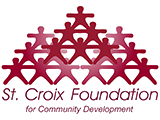In 2009, Bill Gates released his first Annual Letter to update the nation on his foundation’s work in education. At the time, we were concluding our work in several public schools and analyzing the data we had compiled. There were many commonalities between Gates’ findings and ours, and his conclusions were not only instructive for the St. Croix Foundation but should be enlightening for our entire community.
Having spent over 2 billion dollars in nine years to raise college-ready graduation rates in public schools, Bill Gates acknowledged that the Gates Foundation did not achieve the results they wanted. In his words:
- Many of the small schools that we invested in did not improve student achievement in any significant way. These tended to be the schools that did not take radical steps to change the culture such as allowing the principal to pick their team of teachers or change the curriculum.
- We had less success trying to change an existing school than helping to create a new school.
- …a few of the schools that we funded achieved something amazing. They replaced schools with low expectations and low results with ones that have high expectations and high results. Almost all of these schools were charter schools that have significantly longer school days than other schools.
Today, after almost ten years of work in our public schools, our conclusions about how to achieve public education excellence are closely aligned with Gates’ and others who are pushing for reform from outside the system. But, Gates’ reference to charters was the single piece of data that struck us as interesting because, up to that point, the Foundation had not dedicated any attention to the issue of charter schools as a viable pathway for rapid educational reform. Instead, we maintained our commitment to our Department of Education and the potential we firmly believe it has to successfully close the achievement gap for our students.
For those who do not fully understand what charter schools are, the U.S. Department of Education Institute of Education Sciences defines them as: “Public schools that operate with freedom from many of the local and state regulations that apply to traditional public schools. Charter schools allow parents, community leaders, educational entrepreneurs, and others the flexibility to innovate and provide students with increased educational options within the public school system. Charter schools are sponsored by local, state, or other organizations that monitor their quality while holding them accountable for academic results and responsible fiscal practices.”
Historically, charter schools have been vehicles for creating innovative educational opportunities for parents and students, which is why many proponents believe so strongly in them. They have also afforded educators opportunities to bypass governmental bureaucracies that stifle innovation.
Still, there is no guarantee that charters will offer students anything better than conventional public schools do as many have reported worse results—a real dilemma for parents and community leaders. However, there is a growing number of charter schools that are producing rapid and extraordinary results that we believe demand our consideration. Arne Duncan, Secretary of Education for the USDOE, summed the issue up like this, “I do not support charter schools. I support good charters.” We would add, we support great schools, whatever form they take.
Today, despite the fact that charters are independently run public schools and are popping up all over the country, there is great controversy that surrounds the word “charter,” primarily because at the core of the matter is money. As dollars that have been dedicated to failing schools are being re-directed to charters, political firestorms are becoming commonplace in underperforming school districts across the country.
As it stands, the Virgin Islands joins only 8 other states that have not passed charter legislation. And, while there is a charter school bill before the VI Legislature, the Foundation agrees with two key positions held by the National Alliance for Charter Schools: 1) charter schools are most successful when there is strong legislation governing their creation and operation and; 2) charter schools are just one of many components of successful 21st Additionally, with the U.S. pledging billions of dollars to support innovative public school models, including charters, we believe the Territory would be remiss to not examine every reform strategy that could avail the VI of much needed educational funding to support our reform efforts. Century educational systems.
We recommend that all education stakeholders (particularly parents and policy makers) review model legislation as well as our pending legislation at https://usvisenate.org/policy-initiatives/charter-schools/ to broaden their understanding of charter schools. We also urge policy makers to research successful charters and great schools like the New American Academy, KIPP, the Harlem Children’s Zone’s Promise Academy and the Success Academies. This election season, let’s ask our candidates how they recommend providing more choices for parents, opportunities for students, and the flexibility to innovate for principals and teachers.
This editorial is part of the St. Croix Foundation’s Education First Campaign. For more information, call 773.9898.
SOURCES:
Bill Gates Education Reform Findings
Annual Letter 2009, Bill & Melinda Gates Foundation, pages 10-13:
https://www.gatesfoundation.org/who-we-are/resources-and-media/annual-letters-list/annual-
letter-2009
Charter School Definition
US Department of Education:
https://www2.ed.gov/parents/schools/choice/definitions.html
States with Charter School Legislation
The Center for Education Reform:
“The eight remaining states who have not passed charter legislation are: Alabama, Kentucky, Montana, Nebraska, North Dakota, South Dakota, Vermont, and West Virginia.”
https://www.edreform.com/issues/choice-charter-schools/laws-legislation/
General Information
U.S Virgin Islands Charter Legislation: https://usvisenate.org/policy-initiatives/charter-schools/
National Alliance for Public Charter Schools: https://www.publiccharters.org/get-the-facts/
New American Academy: https://www.thenewamericanacademy.org/
KIPP – The Knowledge is Power Program: https://www.kipp.org/
Harlem Children Zone’s Promise Academy: https://hcz.org/our-programs/promise-academy-charter-schools/
Harlem Children Zone’s Success Academy: https://successacademies.org/
